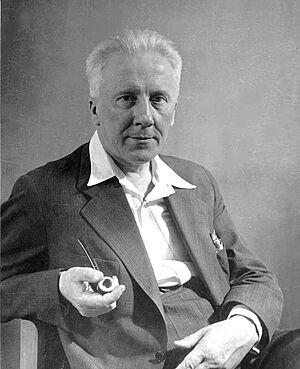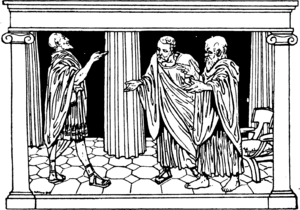Władysław Witwicki facts for kids
Władysław Witwicki (born April 30, 1878, in Lubaczów – died December 21, 1948, in Konstancin) was a very important Polish thinker. He was a psychologist, a philosopher, and a translator. He mostly translated the works of Plato into Polish. Witwicki was also a historian of philosophy and art, and an artist. Many people consider him one of the founders of psychology in Poland.
Witwicki created ideas like the theory of cratism and a theory about feelings. He also studied the psychology of religion and worked on creating secular ethics. He helped start the Polish Philosophical Society. He was also part of a group of thinkers known as the Lwów–Warsaw school.
Contents
Who Was Władysław Witwicki?
Władysław Witwicki was the fifth child in his family. His mother was Urszula Witwicka, and his father was Ludwik–Filip Wasylkowicz Witwicki. Władysław Witwicki was also the father of Janusz Witwicki. Janusz helped create the famous Plastic Panorama of Old Lviv, which showed old Lviv in a special artistic way.
Witwicki's Education and Teaching Career
Witwicki studied at the University of Lviv. There, he was a student of a famous professor named Kazimierz Twardowski. He also studied at other universities, like the University of Vienna and the Leipzig University. At Leipzig, he learned from Wilhelm Wundt, who is often called the "father of psychology."
From 1905 to 1918, Witwicki taught at schools called gymnasiums in Lviv. He also gave lectures at the University of Lviv. Later, in 1919, he became a professor at the University of Warsaw, where he taught until 1948.
What Did Witwicki Write About?
Władysław Witwicki wrote the first textbooks on psychology in Poland. He also worked with other philosophers. For example, he teamed up with Bronisław Bandrowski. Together, they developed a way of understanding psychology based on Franz Brentano's ideas. This included looking at Edmund Husserl's ideas about thinking and what things mean.
Witwicki's Views on the Gospels
Witwicki translated parts of the Bible, specifically the Gospel of Matthew and the Gospel of Mark. His translation was called Dobra Nowina według Mateusza i Marka (which means The Good News according to Matthew and and Mark). In his notes for these translations, Witwicki shared his thoughts on the mental state of Jesus. He described Jesus as having a strong sense of his own power and importance. Witwicki also suggested Jesus might have had difficulty connecting with others.
Witwicki's Artistic Side
Witwicki was a talented artist. He drew pictures for books, including his own translations. He created beautiful watercolors, etchings, and woodcuts. He also designed bookplates, which are special labels for books.
He designed covers for magazines and even made plaster busts. He reviewed art shows and wrote about different artists. Witwicki also helped his son, Janusz, create the Plastic Panorama of Old Lviv. He gave talks and wrote articles about art. He even wrote textbooks for art students, like Wiadomości o stylach (About Styles) and O widzeniu przedmiotów: Zasady perspektywy (Seeing Objects: Principles of Perspective). Another book was Anatomia plastyczna (Plastic Anatomy), which helped artists understand the human body.
Key Books by Witwicki
Here are some of the important works by Władysław Witwicki:
- Translations of Plato's dialogues (conversations between famous Greek thinkers).
- Psychologia do użytku słuchaczów wyższych szkół naukowych, vol. 1–2 (1925–1927) – These were psychology textbooks for university students.
- Wiadomości o stylach (1934) – A book about different art styles.
- Wiara oświeconych, 1959 (originally in French: La foi des éclairés, 1939) – This book explored the beliefs of educated people.
- Przechadzki ateńskie (1947) – A series of radio programs about his "Athenian Walks," first aired in 1939.
- Dobra Nowina według Mateusza i Marka (1958) – His translations of the Gospel of Matthew and Mark, which included his psychological analysis. He wrote this in 1942.
See Also
- History of philosophy in Poland
- List of Poles
- List of psychologists
 | James Van Der Zee |
 | Alma Thomas |
 | Ellis Wilson |
 | Margaret Taylor-Burroughs |



